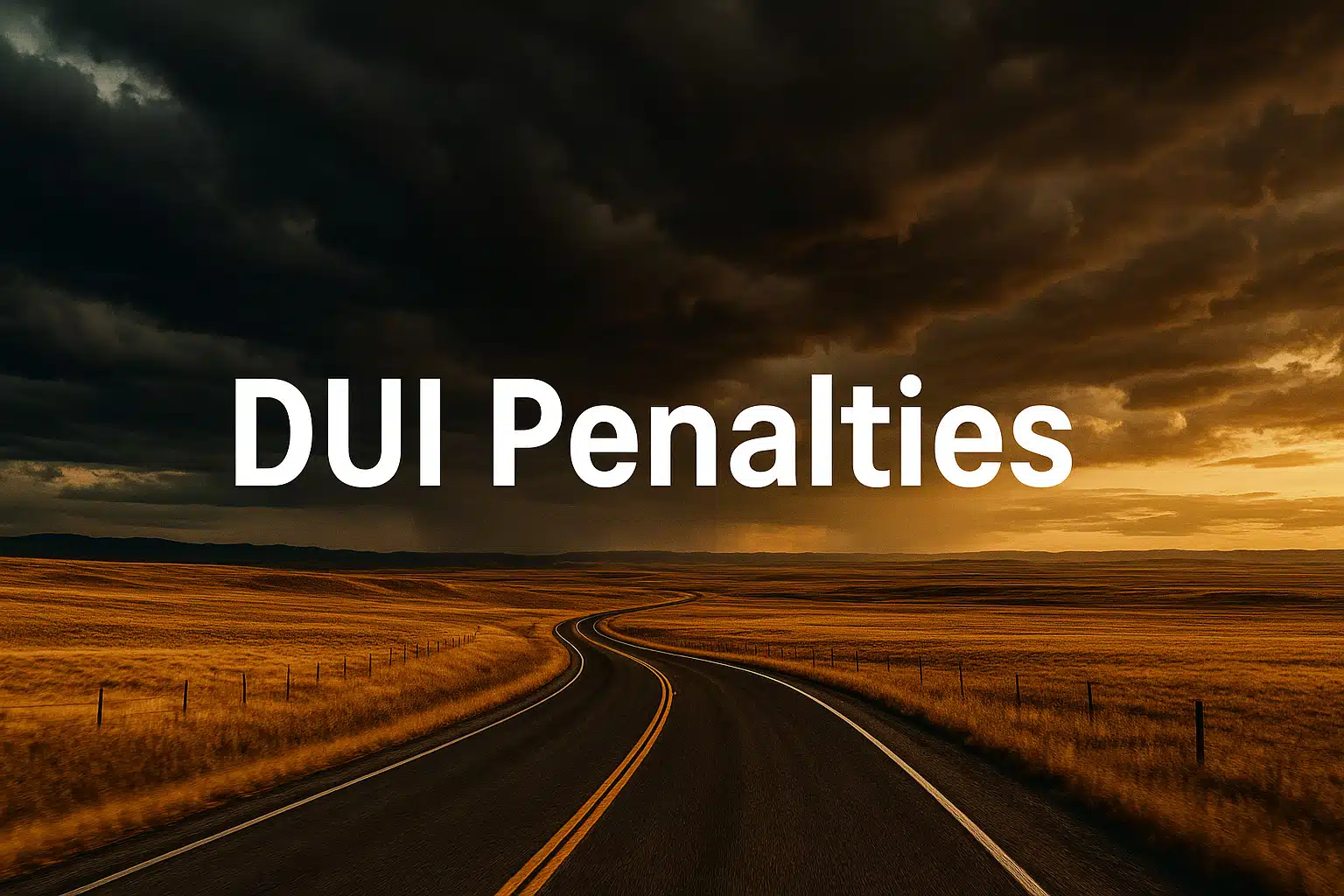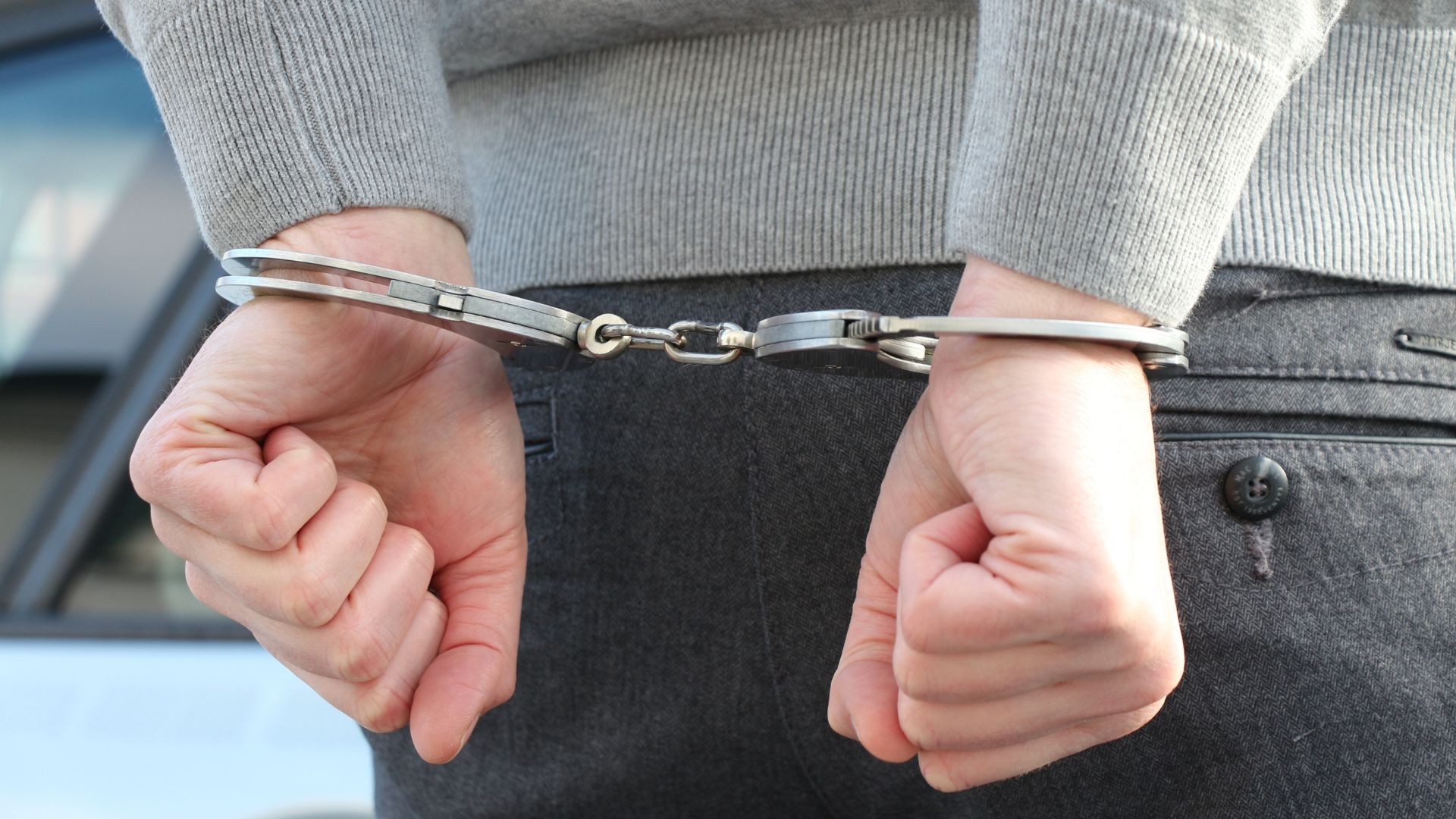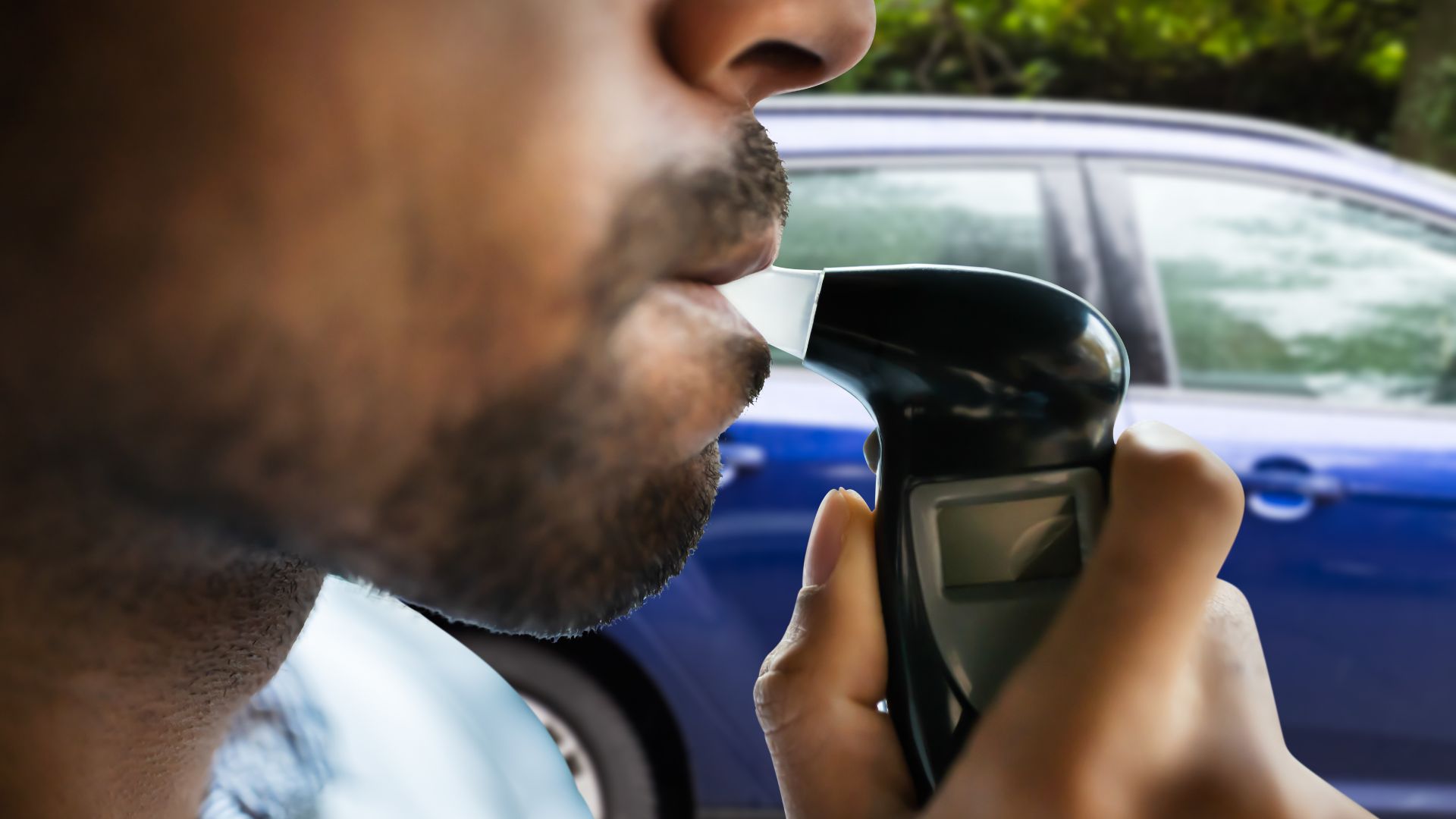Montana DUI penalties have recently changed and are strict and get worse with each offense. Whether you face a first offense DUI in Montana or have prior convictions, understanding the consequences helps you prepare for what lies ahead. The state imposes heavy fines, jail time, and license suspensions that increase with repeat violations. First-time offenders face different penalties than repeat DUI offenders, but all cases carry serious legal and personal consequences.
If you’re dealing with DUI charges, knowing Montana’s penalty structure is your first step toward making informed decisions about your case.
Facing DUI charges? Contact our experienced legal team for immediate guidance on your case.
Key Takeaways: Montana DUI Penalties
- Stricter Laws: Montana has recently toughened DUI laws, with penalties increasing for each repeat offense.
- BAC Limits: Legal limits are 0.08% for adults, 0.02% for under 21 drivers, and 0.04% for commercial drivers. BAC of 0.16% or higher qualifies as Aggravated DUI.
- First Offense: Up to 6 months in jail, fines of $600–$1,000, 90-day license suspension, required evaluation/treatment, and possible 24/7 Sobriety monitoring.
- Second Offense: Mandatory 7 days to 1 year in jail, $1,200–$2,000 in fines, 6-month suspension, and ignition interlock required for restricted driving.
- Third Offense: Minimum 30 days in jail, fines of $2,500–$5,000, 1-year suspension, and intensive treatment with probation monitoring.
- Felony DUI (4th+): At least 13 months in state custody (often in treatment), up to 5 years prison, fines of $5,000–$10,000, and long license suspensions.
- Aggravated DUI: Triggered by high BAC, driving on a suspended license, or violating interlock requirements—leads to enhanced jail time and fines.
- Administrative Penalties: DMV imposes separate suspensions (90 days for first, 6 months for second, 1 year for third+), plus ignition interlock requirements.
- Refusals: Refusing a breath or blood test triggers automatic suspension (6 months first refusal, 18 months for second).
- County Differences: Penalties are statewide, but practices vary—Missoula emphasizes strict monitoring, while Bozeman offers treatment court alternatives.
- Financial Impact: Costs extend beyond fines—treatment, monitoring, interlock, SR-22 insurance, and higher premiums add thousands more.
- Attorney Advantage: A skilled DUI defense lawyer can challenge procedures, negotiate alternatives, and navigate county-specific practices to reduce penalties.
Montana DUI Laws Overview
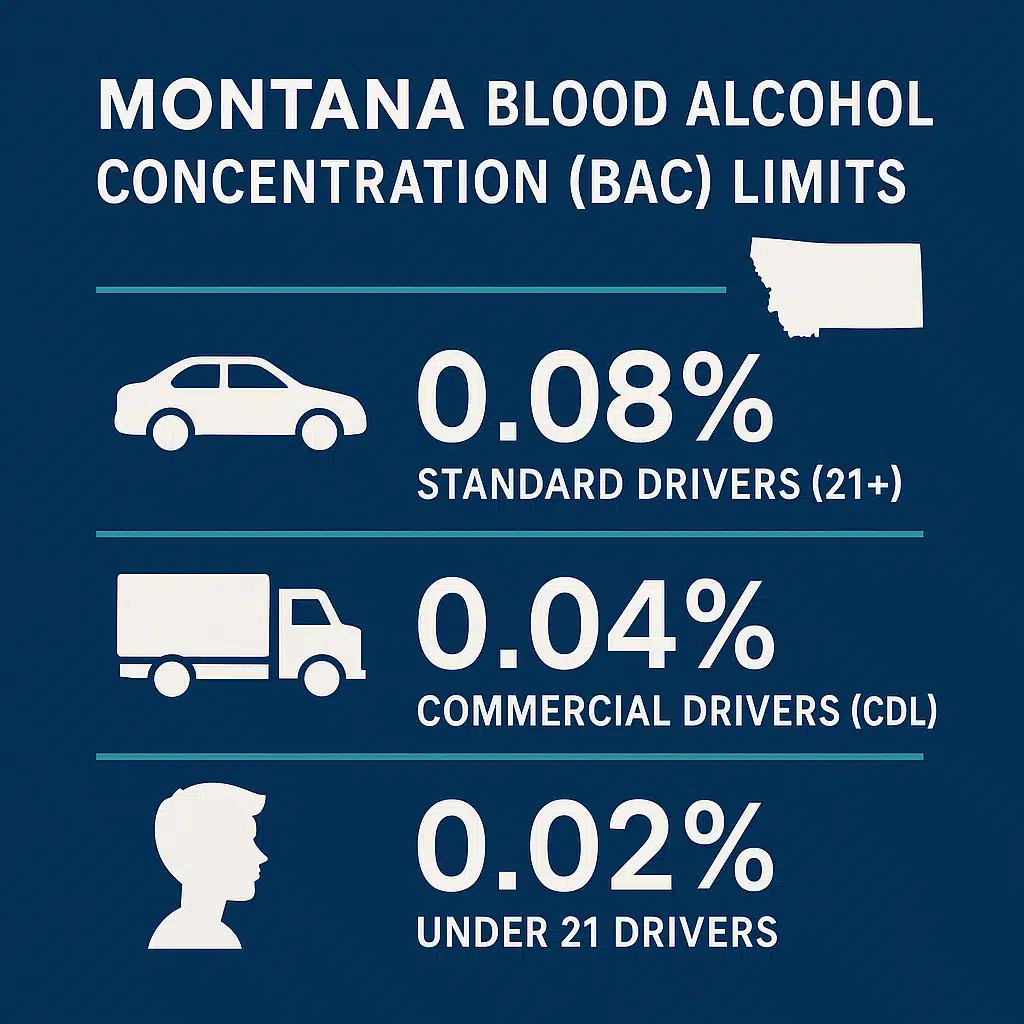
Montana law defines DUI as operating a vehicle while impaired by alcohol or drugs. The state sets clear blood alcohol thresholds for DUI related crimes: 0.08% for adults, 0.02% for drivers under 21, and 0.04% for commercial drivers. Montana also recognizes an Aggravated DUI classification for high BAC levels at or above 0.16 or above or other serious circumstances.
Under Montana’s DUI sentencing guidelines, penalties increase with each offense. The law outlines specific jail terms, fines, and license suspensions based on whether it’s your first, second, third, or subsequent conviction. These guidelines ensure consistent punishment across the state while giving judges some room to consider individual circumstances.
Penalties for a First-Offense DUI in Montana
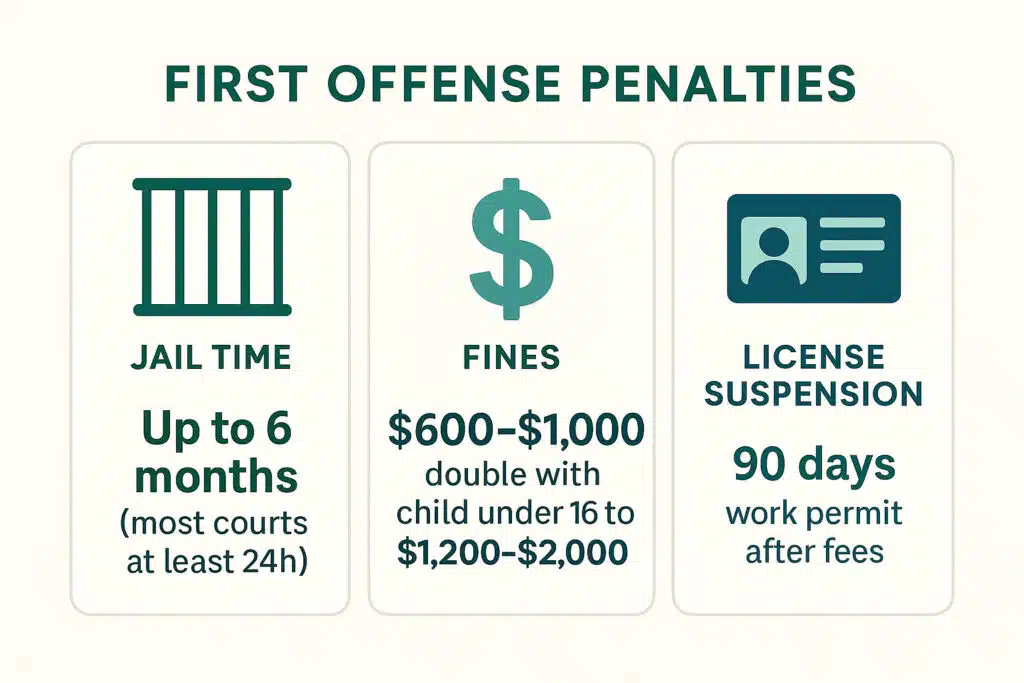
A first offense DUI in Montana is a misdemeanor that can still change your life. The criminal penalties include possible jail time of up to 6 months in county jail. Most courts require at least 24 hours in jail, even for first-time offenders. This might be the day you already spent in custody after arrest, or in certain courts this requirement can be met via house arrest or alternative incarceration situations.
Fines range from $600 to $1,000, not counting additional court fees and surcharges. If you had a passenger under 16 in your vehicle, these fines double to between $1,200 and $2,000. This enhanced penalty reflects Montana’s serious view of endangering children.
Your driver’s license faces a 90-day suspension upon conviction. During this suspension period, you can get a work permit or probation license, but not until you pay reinstatement fees. This represents a change from Montana’s earlier 6-month suspension for first offenders.
Courts also require first-time offenders to complete a chemical dependency evaluation and education program. Montana often calls this the ACT program. Some judges may order participation in the state’s 24/7 Sobriety Program as a probation condition. This program requires frequent alcohol testing to ensure you stay sober.
Additional costs pile up quickly. You’ll pay for the evaluation, education classes, and any required monitoring programs. These expenses add hundreds of dollars beyond the basic fine.
First-time DUI charge? Understanding your options early can make a significant difference in your case outcome. Learn about our defense strategies designed to protect first-time offenders.
Penalties for a Second DUI Offense in Montana
A second DUI conviction brings much harsher punishment while still remaining a misdemeanor. Montana law requires a mandatory minimum jail sentence of 7 days and up to 1 year in jail. The mandatory minimum number of days lessens to 5 days minimum if your prior offense was a DUI per se (not regular DUI), or 7 days if it involved refusal or actual impairment evidence.
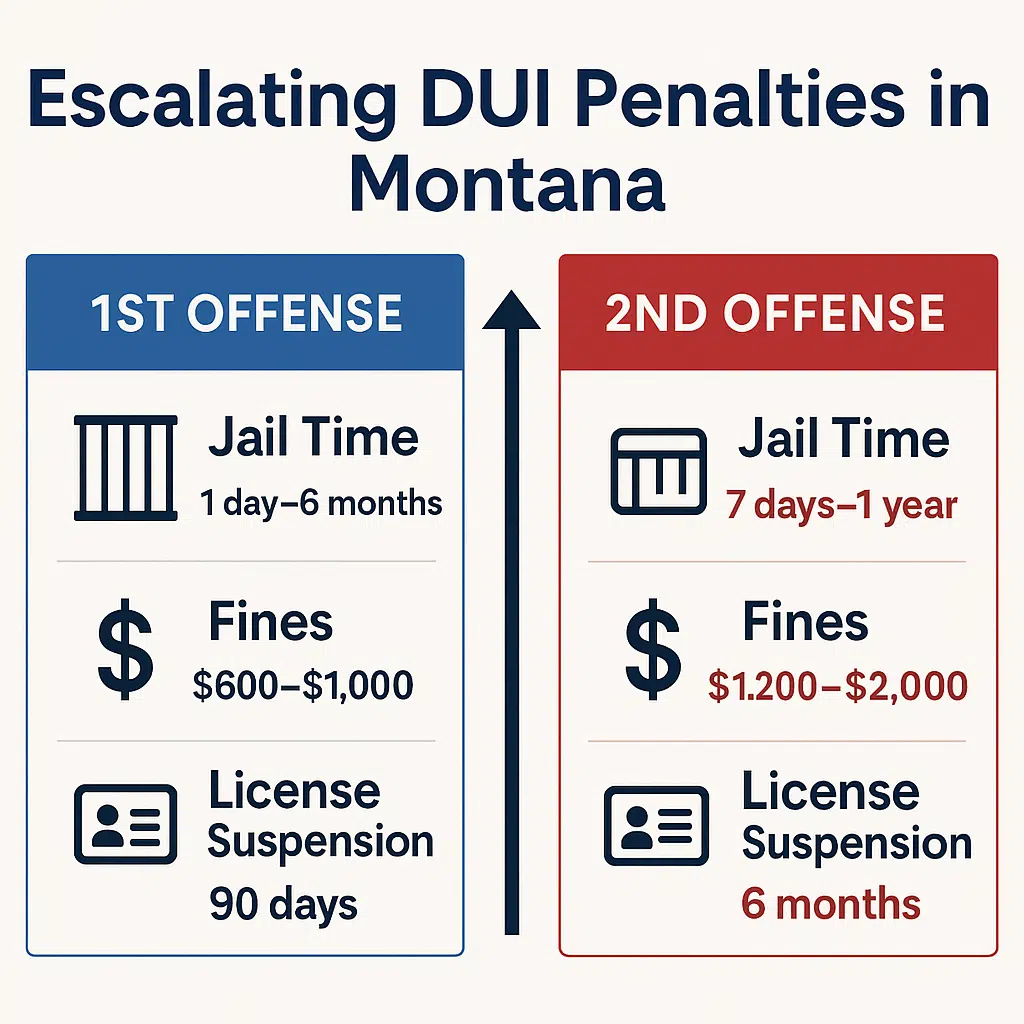
The court can impose up to one year in jail for a second offense. This jail time cannot be served on house arrest or deferred. You must serve the mandatory minimum in actual jail, though judges may suspend part of the sentence after you complete the required days.
Fines increase to $1,200 to $2,000 for a second conviction. If a child under 16 was in your car, fines double to $2,400 to $4,000, and mandatory jail time doubles to 10 days minimum.
Your license suspension extends to 6 months for a second offense. You typically cannot drive at all for the first 45 days. After that waiting period, you may qualify for a restricted license if you meet certain conditions. Installing an ignition interlock device is usually required for any driving privileges.
Courts almost always order chemical dependency treatment programs for second offenders. Many jurisdictions use 24/7 Sobriety Program monitoring or SCRAM ankle bracelets for repeat offenders. Missoula’s Municipal Court routinely orders SCRAM alcohol monitoring for second-time DUIs with high BAC levels. These monitoring systems help prevent further offenses during probation.
Under Montana’s DUI sentencing guidelines, a second offense carries at least a 5-day jail term that cannot be suspended. This mandatory minimum shows the state’s commitment to deterring repeat offenses.
Penalties for a Third DUI Offense in Montana
By your third DUI, Montana’s penalties become very severe. A third offense remains a misdemeanor but carries substantial mandatory jail time. You face a mandatory minimum of 30 days to one year in jail, with 30 days being the mandatory minimum straight time. No part of that 30-day minimum can be deferred or served on home arrest.
Judges often require third-time offenders to serve significant jail time beyond the minimum. Even if they suspend part of the one-year maximum sentence, you’ll likely spend months behind bars. If you had a passenger under 16, the minimum jail time doubles to 60 days.
Fines range from $2,500 to $5,000 for a third conviction. With a minor passenger, fines double to $5,000 to $10,000. These amounts don’t include additional court costs or required program fees.
A third DUI triggers a one-year driver’s license suspension. Montana law requires a 90-day waiting period before you can even apply for a probationary license. After 90 days, you may get a restricted license if you install an ignition interlock device and comply with court-ordered sobriety monitoring.
Courts push third-time offenders into intensive treatment programs. You’ll typically complete lengthy alcohol treatment, either inpatient or outpatient. Supervised probation follows your jail term. Montana’s 24/7 Sobriety Program and continuous alcohol monitoring become almost certain requirements as judges work to prevent a fourth offense.
Montana has a 10-year lookback period for determining second and third offenses. A DUI more than 10 years old generally won’t count toward a second offense. However, once you have three or more prior DUI convictions, all previous convictions count toward future charges regardless of age. This means a fourth offense becomes a felony even if one prior conviction happened over a decade ago.
Facing a repeat DUI charge? The stakes are higher than ever. Contact our criminal defense attorneys immediately to protect your future.
Felony DUI in Montana (Fourth and Subsequent Offenses)

A fourth DUI offense in Montana becomes a felony with dramatically increased penalties. This reflects the serious risk that chronic offenders pose to public safety. A fourth DUI conviction typically results in 13 months of state prison commitment, followed by a suspended prison term of up to 5 years.
Montana law requires at least 13 months to be served, often in a special treatment program under the Department of Corrections. Judges can impose additional years of imprisonment that may be suspended if you successfully complete treatment and probation. The maximum prison time for a standard fourth-offense DUI is usually 5 years.
Recent legislation increased penalties for fifth and sixth offenses. A fifth DUI conviction can lead to up to 10 years in prison. This gives courts more flexibility in punishing habitual offenders. While the fourth offense has the structured 13-month treatment format, a fifth or sixth offense may allow judges to impose much longer prison terms if necessary.
Fines for felony DUI range from $5,000 to $10,000 under Montana law. This is significantly higher than misdemeanor fines. If the felony DUI involved minors in the vehicle or other serious factors, fines often reach the upper end of this range.
License suspension lasts at least one year for a felony DUI, often longer based on your history. Someone convicted of felony DUI may not qualify for any probationary license for the full suspension period. An ignition interlock will be required when you eventually get your license back.
Montana’s approach to felony DUI emphasizes treatment over pure punishment. The law allows judges to order defendants to treatment facilities for that 13-month period. Only if you fail treatment or reoffend might you serve the remaining term in prison. After release, felony DUI offenders face years of probation with strict conditions.
As of 2025, Montana lawmakers continue strengthening DUI laws. Bobby’s Law created a new offense of aggravated vehicular homicide for drunk drivers who cause fatal crashes, with a minimum 3-year prison sentence. While this law addresses DUI-related fatalities specifically, it shows Montana’s increasing intolerance for repeat impaired drivers.
Facing felony DUI charges? Your freedom is at stake. Schedule an emergency consultation with our experienced criminal defense team today.
Aggravated DUI and Enhanced Penalties
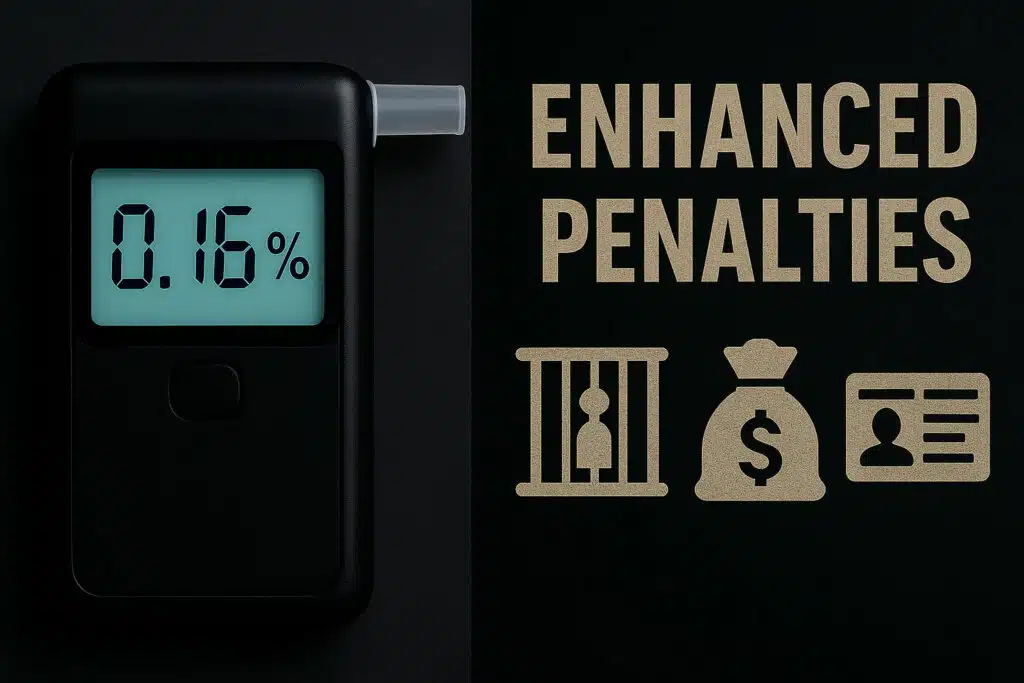
Montana’s Aggravated DUI law triggers tougher sentencing under certain circumstances. Even first-time offenders can face enhanced penalties if their case involves aggravating factors.
A DUI becomes aggravated when your BAC was 0.16% or higher, double the legal limit. Driving on a suspended or revoked license due to a prior DUI also creates aggravated charges. If you were required to have an ignition interlock device but drove without one, this also qualifies as aggravated DUI.
Having a child passenger under 16 serves as an aggravating factor that enhances penalties, though Montana addresses this through separate enhanced penalty provisions rather than the specific aggravated DUI statute.
An aggravated DUI carries enhanced penalties within the same misdemeanor framework. This means more mandatory jail time and higher fines within the allowed ranges. A first-offense aggravated DUI has a mandatory minimum of 48 hours in jail versus no minimum for a standard first DUI. Judges often impose sentences closer to the maximum allowed time.
Courts typically require additional conditions for aggravated DUI cases. These include longer sobriety monitoring periods, ignition interlock installation for any probationary driving, and mandatory participation in specialized treatment programs. High-BAC offenders usually must complete alcohol education programs designed for serious offenders.
Generally, offenders convicted of aggravated DUI face more jail time and higher fines than a regular DUI at the same offense level. A first-offense aggravated DUI might involve several days in jail instead of just one day.
Administrative Penalties and License Consequences
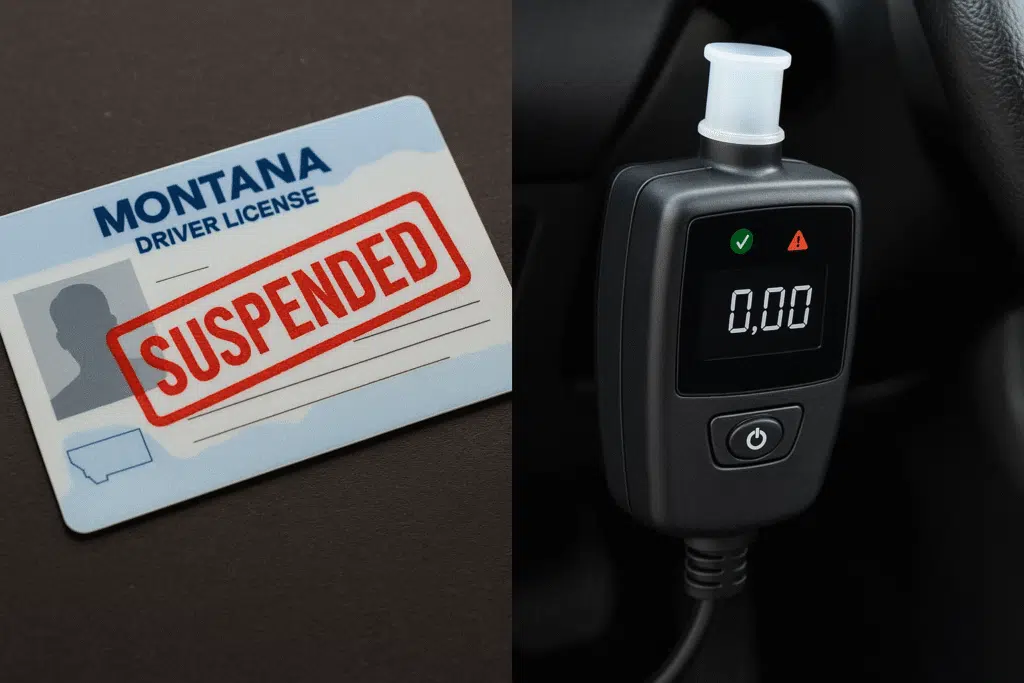
Beyond court-imposed criminal penalties, DUI offenders face administrative sanctions from the Montana Department of Motor Vehicles. These license-related consequences operate separately from your criminal case.
License suspension durations follow Montana’s statewide standards: 90 days for a first conviction, 6 months for a second, and one year for a third or subsequent conviction. A DUI conviction in Missoula or Bozeman results in the same base suspension length. However, local judges might add probation conditions that effectively extend how long you cannot drive.
Montana allows probationary driver’s licenses in some cases during suspension, but with strict restrictions. For a first offense, a probationary license is possible immediately or after a 30-day waiting period if the judge recommends it. Second offenses require a 45-day wait before eligibility. Third offenses have a 90-day waiting period.
Ignition interlock devices are typically required to obtain a probationary license, especially for repeat offenders or those with BAC levels of 0.16% or higher. An ignition interlock is a breath-test device wired into your car. You must blow clean to start the vehicle. Montana law mandates ignition interlock installation for second and subsequent DUI offenders seeking limited driving privileges. Judges often order ignition interlocks for first-time aggravated DUI offenders as well.
Refusing a chemical BAC test triggers separate penalties under Montana’s implied consent law. A first refusal results in a six-month administrative suspension. This occurs even before your DUI case resolves in court. If you refuse the breath or blood test, you lose your license for six months, or 18 months for a second refusal. These refusal suspensions add to any suspension from a conviction.
Anyone convicted of DUI faces significantly higher auto insurance premiums and must file an SR-22 certificate of financial responsibility. Your insurer files this form to prove you carry high-risk insurance. This requirement often lasts for several years and substantially increases your insurance costs.
Other financial impacts include DUI school or treatment program fees, community service requirements in some cases, and installation plus monthly calibration fees for ignition interlocks or SCRAM bracelets. Participating in the 24/7 Sobriety Program means paying for daily tests. These costs add up beyond the base fine to create substantial financial consequences.
License suspension threatening your livelihood? Learn about your options for maintaining driving privileges during DUI proceedings.
Montana DUI Sentencing Guidelines and Process
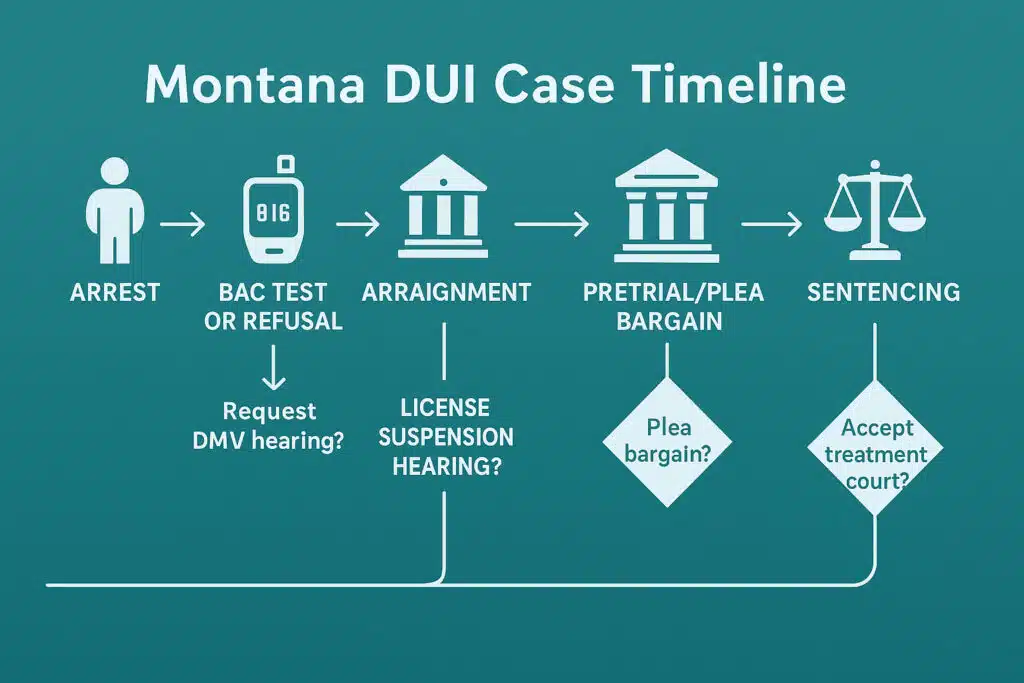
Montana’s DUI laws provide structured sentencing ranges for each offense level with escalating minimum and maximum penalties. State law mandates minimum sentences for second and subsequent offenses. Judges have little discretion to go below those minimums.
A judge must impose at least the minimum jail time and fine, then can choose to go anywhere up to the maximum if circumstances warrant. For first offenses, there isn’t a statutory minimum jail term unless the case involves aggravating factors. This means sentences can vary more widely. Some first offenders might get one day in jail, others might get several days or community service instead, depending on the case facts.
Montana’s sentencing guidelines for DUI set mandatory minimum jail terms that increase with each offense. At least 5 days for a second offense and 30 days for a third cannot be suspended or avoided.
Within these guidelines, judges still have discretion based on case facts. Many DUI cases resolve through plea bargains. A high-BAC first offender might plead to a lesser charge like reckless driving in exchange for certain conditions. However, any plea deal in Montana for a DUI must still meet statutory minimums for that charge.
Prosecutors and defense attorneys often negotiate within these guidelines. An experienced DUI attorney might get a first DUI charge amended to a lesser offense. Montana law prohibits completely deferring or dismissing a DUI without consequences. Some jail or community service, fines, and license impacts will still apply.
Montana’s approach to DUI sentencing often includes rehabilitation components. Courts may suspend part of the jail sentence on condition that you complete a chemical dependency treatment program or DUI court program.
In some areas, DUI offenders can participate in treatment courts as an alternative to lengthy jail sentences. Missoula’s Misdemeanor Drug Court and Bozeman’s BRIDGERS DUI Court offer these programs. Under Montana’s sentencing guidelines, judges can suspend part of the sentence if you successfully complete treatment and comply with monitoring. This approach reflects the guidelines’ goal of reducing repeat offenses through treatment.
If you violate probation or fail to complete required programs, courts can impose the remaining suspended jail or prison time. Someone on a third-offense DUI who had part of their sentence suspended for treatment could be required to serve those additional months in jail if they drop out of the program or get re-arrested.
County-Specific Nuances: Missoula, Bozeman, and Other Montana Jurisdictions
While Montana’s DUI laws apply statewide, county practices can affect how your case feels and progresses. The legal penalties remain consistent, but implementation and available programs vary between jurisdictions.
Missoula courts take DUI enforcement very seriously. Missoula Municipal Court uses SCRAM Continuous Alcohol Monitors for defendants charged with DUI, particularly repeat offenders or high-BAC cases. Someone arrested for DUI in Missoula might be required to remain completely sober and wear an ankle monitor that tests alcohol around the clock while awaiting trial or during probation.
Missoula County actively participates in the state’s 24/7 Sobriety Program. A second-time offender in Missoula might have to report to jail twice daily for breath tests as a bond or probation condition. Missoula’s Municipal Court uses SCRAM alcohol monitoring on all third-time DUI defendants and even on some first or second offenders with high alcohol levels. This reflects a notably strict approach to supervision.
Gallatin County, where Bozeman is located, recently launched the BRIDGERS DUI Treatment Court in Bozeman Municipal Court. This program offers alternative sentencing for second and third DUI offenders struggling with addiction. Instead of simply serving mandatory jail time, eligible participants can enter a closely supervised treatment program.
Judge Colleen Herrington described how the program allows participants to get credit for treatment milestones instead of some jail time. For someone in Bozeman, this court might offer a path to recovery that lessens actual jail time if you comply fully. Not every county offers such programs, making it a unique aspect of Gallatin County’s approach.
Gallatin County’s DUI Task Force actively promotes public education and bar outreach, showing the community’s focus on prevention alongside enforcement.
Smaller counties might not have DUI courts, so repeat offenders there might serve straight jail time. Larger areas like Missoula, Bozeman, and Billings have more resources including treatment programs and specialized probation officers.
No matter if your DUI occurs in Missoula, Bozeman, or a rural county, the statutory penalties are the same. However, the experience can differ. Missoula judges might impose stricter monitoring, while Bozeman offers a treatment court option to reduce jail time if you work through rehabilitation.
[CTA SUGGESTION: Location-specific CTA] Need local representation? Our attorneys understand the unique practices in Missoula and Bozeman courts and can navigate your case accordingly.
Why You Should Consult a DUI Defense Attorney

Montana DUI laws and penalties are complex and change regularly. A seasoned DUI lawyer stays current on the latest changes and understands the sentencing guidelines completely. They can explain what to expect in your specific county and help ensure you meet all requirements, from installing interlocks to scheduling treatment.
An experienced DUI attorney provides valuable guidance, helping you understand the charges, potential penalties, and building a strong defense strategy. Recent changes like the 2021 increase in repeat-offender penalties and new 2025 laws require up-to-date legal knowledge that only practicing attorneys maintain.
What is the difference in attorneys? There is a HUGE difference in attorneys that may make a difference between being convicted of a DUI and not convicted. The attorneys at the Judnich Law Office have all been specifically trained and Educated via the NHTSA (National Highway Traffic Safety Administration) DUI Investigation and Training program. Our attorneys have taken the exact same training as all law enforcement officers must complete in the police academy. We utilize that training and knowledge to understand how and where mistakes were made in the investigation, the administration and scoring of Standardized Field Sobriety Tests. This knowledge is vital in identifying where officers have made mistakes and may mislead a jury, and ultimately ensure our clients have an opportunity for acquittal. In addition our attorneys have been trained in breath test analysis as well as blood testing protocols and procedures that the officers and Montana State Crime Lab must comply with for a blood sample to be properly tested and admitted into evidence in a DUI case. Only the best trained attorneys can give you any hope of a chance at prevailing against a prosecutor and police officer that has already made up their mind that an accused is guilty.
A DUI attorney will examine the circumstances of your traffic stop and arrest. Was the stop legal? Was the breath test given correctly? Montana DUI cases can sometimes be defended on procedural grounds. An attorney might get evidence thrown out if proper protocol wasn’t followed. This could lead to reduced charges or dismissal.
A lawyer familiar with local courts can negotiate plea deals or propose alternatives to minimize jail time. In Missoula, a knowledgeable DUI attorney might negotiate for a client to serve jail time on weekends or obtain credit for time in a treatment program. A Bozeman DUI lawyer could help a client get accepted into the BRIDGERS treatment court, significantly reducing time behind bars.
Because local practices vary, it’s wise to consult a local DUI defense lawyer familiar with the county’s courts. A Missoula DUI attorney will know how SCRAM monitoring and the 24/7 program are typically used in Missoula. A Bozeman DUI lawyer might help clients take advantage of the Gallatin County treatment court program. Local knowledge makes a significant difference in navigating DUI sentencing.
Time is critical in DUI cases. There are deadlines for requesting administrative hearings to challenge license suspension. A DUI attorney can promptly file those requests and preserve your driving rights while the case is pending.
Don’t wait to get help. Contact us today for a free consultation to discuss your case and learn about your options.
Get the Defense You Deserve
If you or a loved one is facing a DUI charge in Montana, whether it’s your first offense or you have priors, contact our DUI defense team for a consultation. We have experienced Montana DUI attorneys in both Missoula and Bozeman who can evaluate your case and fight to achieve the best possible outcome.
Understanding Montana DUI penalties is important, but having skilled legal representation can make the difference between minimum and maximum consequences in your specific situation. Contact Judnich Law today to protect your rights and your future.

